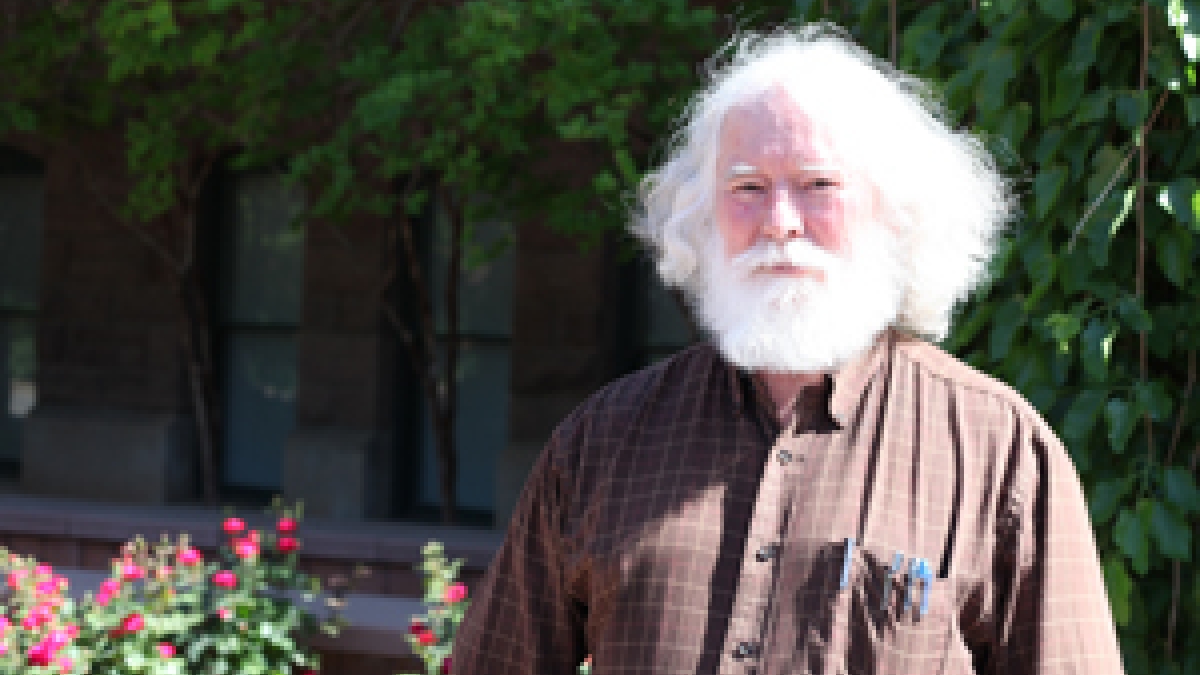ASU student graduates after 36-year hiatus

"If you think the cost of getting an education is a lot, the cost of not getting an education is even greater,” says Randy Sanders, a determined Russian major from the School of International Letters and Cultures in the College of Liberal Arts and Sciences. “Because I did not get a degree some 36 years ago, it has cost me an arm and a leg.”
Sanders knows what he’s talking about.
During his senior year in 1975, Sanders had to drop out of ASU because of physical illness and visual difficulties. After enduring a lifetime of trials, Sanders will finally graduate this spring with a bachelor's degree in Russian. While a bright future lies ahead, his journey hasn’t been easy.
Born in Mountain Home, Arkansas, Sanders moved to Arizona when he was eight years old. Influenced by an Arizona high school teacher who taught Russian during his senior year of high school, Sanders chose Russian as his college major.
“The Russian language was a hot commodity back then because of the Cold War,” he says. His initial plan was to pursue a professional career in language translation or interpretation. But despite his promising aptitude for language learning, Sanders’ parents legally disowned him when he decided to go with Russian as his major. “Decisions have consequences,” he says. “There was a ‘Red Scare’ going around back then.”
At ASU he continued to suffer from his physical disabilities and visual difficulties, making it very hard to keep up with his studies. He struggled to walk, read and sleep.
“Intractable, life-threatening pain, daily, constantly, totally consumed me,” Sanders says.
During his junior year at ASU, Sanders suffered a heart attack while climbing A-Mountain with some friends. Forced to drop out of school the next year, he was living off $12 a month for food. Because of his health and dwindling finances, Sanders became homeless for three years.
He eventually found some work delivering pizzas, washing dishes and working on a watermelon farm, where he was electrocuted. He also attended AutoCAD drafting school where he suffered from severe galvanized poisoning from welding, making it impossible for him to work for the next two years.
One of Sanders' major challenges was vision impairment. Even as a high school student, he recalls that “reading was painful, but necessary. ... I could only read for 15 minutes at a time, maybe one hour a day.”
Remarkably, when Sanders was 57, he saw an online advertisement for “The Note-Taker,” an invention designed by ASU student David Hayden. The Note-Taker is a camera device, which simultaneously provides students with a view of the white board and their notes, aiding vision-impaired students in the classroom. Sanders encountered advertisements for The Note-Taker three times before making the decision to go back to school. New knowledge about the availability of disability resources at ASU also helped Sanders make the decision.
“I had been out of work for two or three years at that point," says Sanders. "I was living in a local homeless shelter. I had nothing to lose and everything to gain." He re-enrolled and took additional courses at Mesa Community College to catch up with the updated degree requirements for his Russian major.
While at ASU the second time around, Sanders took nearly every Russian-related course available, and has also excelled in the study of a number of other languages, including Spanish, Mandarin and Albanian.
"Randy was the best student in my History of Slavic Languages course last fall," says Danko Sipka, professor of Slavic languages and applied linguistics.
After graduation, Sanders plans to pursue a master’s degree in teaching English. “Teaching English is in high demand worldwide,” he says.
Sanders' journey to graduation has been long and frequently interrupted, yet his determination remained. For incoming freshman or non-traditional college students, Sanders recommends a “study first and play later” approach.
“Use your time well,” he advises. “Time does not come back. Remember that school is only the minimum. It is only a start. Start to create the life that you want now.”
Story by Alison Graham, communications intern in the School of International Letters and Cultures.